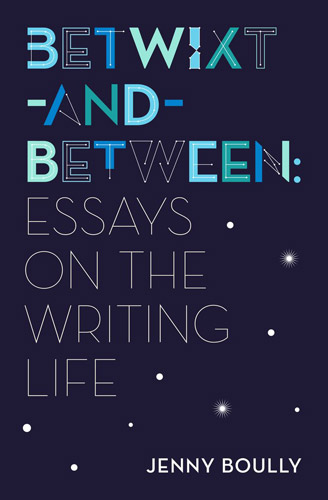Betwixt-and-Between
My first introduction to Jenny Boully’s work was her essay The Body, which is written entirely in footnotes and has a whole lot of white space. What an inventive mind, I thought, and her latest book, Betwixt-and-Between: Essays on the Writing Life, reinforces that thought.
My first introduction to Jenny Boully’s work was her essay The Body, which is written entirely in footnotes and has a whole lot of white space. What an inventive mind, I thought, and her latest book, Betwixt-and-Between: Essays on the Writing Life, reinforces that thought.
When you pick up a copy of her latest, though, don’t be misled by her subtitle. This isn’t a how-to book. These essays, written over a twenty-year time span, carry tones of autobiography, philosophy, stream of consciousness, romantic escapades, and, yes, there are passages that directly address writing.
These words, for example, are targeted at poets:
When life filters through you, and it has given you a gift (and you’ve already been gifted [ . . . ] with the swift ability to conjure language), will you be poet enough to return this gift on the page? Life will filter through you and deposit gifts your way. You must be astute enough to see what each thing has to say.
In her superb essay, “Einstein on the Beach/Postmodernism/Electronic Beeps,” Boully’s starting point is Robert Mapplethorpe’s photo of Philip Glass and Robert Wilson who collaborated on the unconventional opera Einstein on the Beach. In the opera; “There is repetition, change through repetition, collaging, splicing of the overheard, fragments of conversations, [ . . . ] historical inquiry and plundering, the inclusion of the seemingly insignificant and the mundane . . . .”
This pairs with her writing, in which, “there exists an impulse to false start, to say exact words over again, to abruptly insert a pronouncement, to skip over pertinent parts, to return to a scene over and over again.”
Boully was born in Thailand and grew up in Texas. She explains in some of the autobiographical portions that she is of mixed race: “My father grew up knowing only that he was half Cherokee, half white. [ . . . ] My mother is Thai, but she has curly hair, as do I, which leads me to think there must be something else lurking in there.”
Her mixed race is relevant here because of how it has influenced her life: “I did not look like the other kids,” she writes at one point. Then, as an adult working in a mall in Virginia, “One day, on break, a local came up to me and asked if I was ‘mixed.’”
It’s also relevant in her writing:
In terms of what I write, it seems that my writing is also mixed. I am sometimes called a poet, sometimes an essayist, sometimes a lyric essayist, sometimes a prose poet. My second book was published under the guise of fiction/poetry/essay. I find these categorizations odd: I have never felt anything other than whole. It seems to me that the inability to accept a mixed piece of writing is akin to literary discrimination.
Elsewhere, Boully incorporates events and ideas that have caught her attention, like NASA’s Voyager probes, old movies, and mythology. She also devotes a chapter to witchcraft, a subject that’s interested her since childhood: “In witchcraft,” she writes, “there is something called the threefold law. It means that everything you do has repercussions, and those repercussions will be threefold. So when, with insincerity, I made that boy fall in love with me, I faced, threefold, a very bad repercussion.”
She moves on to adult love: “In reading and in lovemaking, the memory fails, gives way to self-made omissions,” and she includes this delightful sentence on relationships:
Although we really mean whatever it is we mean when we say what we say, we realize often, after the fact, that perhaps what we really meant was something else entirely or perhaps we should have said what we said in a slightly different way: perhaps our fates are tied to how we punctuate.
For a sampling of Boully’s philosophical thoughts, she writes this about technology: “Due to our desire to preserve information in the most compressed form achievable, we may eventually, however inadvertently, erase the very information we are striving to preserve.” However:
Writers [ . . . ] have been ahead of this technology since the beginning of information storage, as it is they who have always, in efforts to live forever, transferred the whole of their beings onto paper, attempting to take the soul—that very spacious thing—and install it into the finite space of a book.
In Betwixt-and-Between: Essays on the Writing Life, Jenny Boully is following through on the title, offering an impressive glimpse into her public and private moments and her revelations about life.





